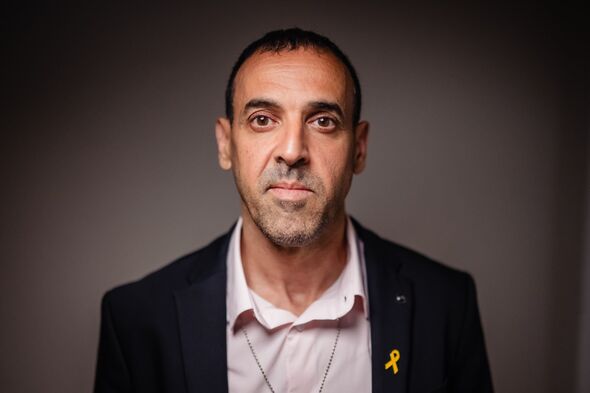
On October 7, 2023, masked Hamas militants stormed Kibbutz Be’eri near Israel’s southern border, leading to a sequence of traumatic events that changed the lives of many, including Eli Sharabi. In an exclusive interview, Sharabi recalls the harrowing experience of being kidnapped, as he publishes the English language version of his book, Hostage, chronicling his 491 days in captivity.
The day began with chaos as Eli, a 53-year-old resident of the kibbutz, was forcibly taken from his home, leaving behind his British wife, Lianne Brisley, and their two daughters, Noiya, 16, and Yahel, 13. Sharabi vividly remembers the terror in their eyes as he was bundled into a stolen vehicle. Tragically, he would never see them alive again; all three were murdered shortly after his abduction.
Reflecting on that moment, he recalls a singular prayer that dominated his thoughts: “Just not a tunnel, please, God, not a tunnel.” For Sharabi, the idea of being buried underground in darkness was a nightmare he desperately wanted to avoid. He was one of the approximately 250 Israelis taken across the border into Gaza on that day, amidst a wave of violence that resulted in at least 1,195 deaths, including those of his family members.
Sharabi learned of his loved ones’ fate only after his eventual release on February 8, 2024, as part of an agreement between Hamas and Israel. His brother, Yossi, was also kidnapped but was killed after 100 days in captivity. The emotional toll of this loss weighs heavily on him. “I had hoped they had survived, but deep down I knew there was a strong possibility they had been murdered,” he reflects.
Life After Captivity
Despite the physical and emotional scars from his captivity, where he was starved, beaten, and confined in darkness, Sharabi has found a path toward healing. He emerged weighing less than 45 kilograms and struggled to walk after being shackled for so long. Writing Hostage has been both a painful and therapeutic process for him, as he shares a significant chapter of his life and his country’s history.
Although he has made strides in his recovery, Sharabi acknowledges that the journey is ongoing. He recently returned to the site of his former home but felt unable to enter. “Not just yet,” he says, emphasizing the need for more time before confronting the memories associated with that place. He is now focused on advocating for the remaining 48 hostages still held by Hamas, driven by a sense of duty and a desire to raise awareness of their plight.
Surrounded by family and friends, Sharabi has regained some sense of normalcy. He plans to move into his own apartment soon, marking a significant step toward rebuilding his life. “I have to start my life again. I am so lucky to be alive and to be a free man. Freedom is priceless,” he states.
Shared Experiences and Survival
During his time in captivity, Sharabi was held with various hostages, including Ori Danino, Almog Sarusi, and Hersh Goldberg-Polin, all of whom were murdered. He spent much of his time with Alon Ohel, a young musician who remains a hostage. “I did my best to look after him,” Sharabi explains, underscoring the importance of supporting one another in extreme circumstances.
The group often prayed together and performed Jewish rituals to maintain hope and solidarity. Despite the dire conditions, including extreme hunger and humiliation, Sharabi never lost faith in his survival. “I never once thought I wouldn’t survive. I am a very positive person,” he asserts.
The hunger was particularly challenging; during the last six months of his captivity, he subsisted on minimal food. “The hunger turns each man inward. Empathy dries up. These are hard moments,” he writes, highlighting the psychological toll of such deprivation. The hostages endured daily humiliations, including being chained together and forced to confront unsanitary conditions.
Sharabi’s story does not merely focus on his personal trauma but also reflects a broader sense of loss and resilience within the Israeli community. He emphasizes that many people he speaks to are exhausted from the ongoing conflict and yearn for peace. “Most I speak to have had enough,” he says, sharing his hope for healing and closure.
Looking to the future, Sharabi aspires to become a private mathematics tutor for young people, channeling his experiences into something positive. “I choose to move on and be positive, I choose light,” he concludes, embodying the spirit of resilience that has defined his journey since that fateful day.
Hostage by Eli Sharabi (Swift Press, £18.99) is available now, offering readers an intimate look into the realities of captivity and the enduring human spirit.






